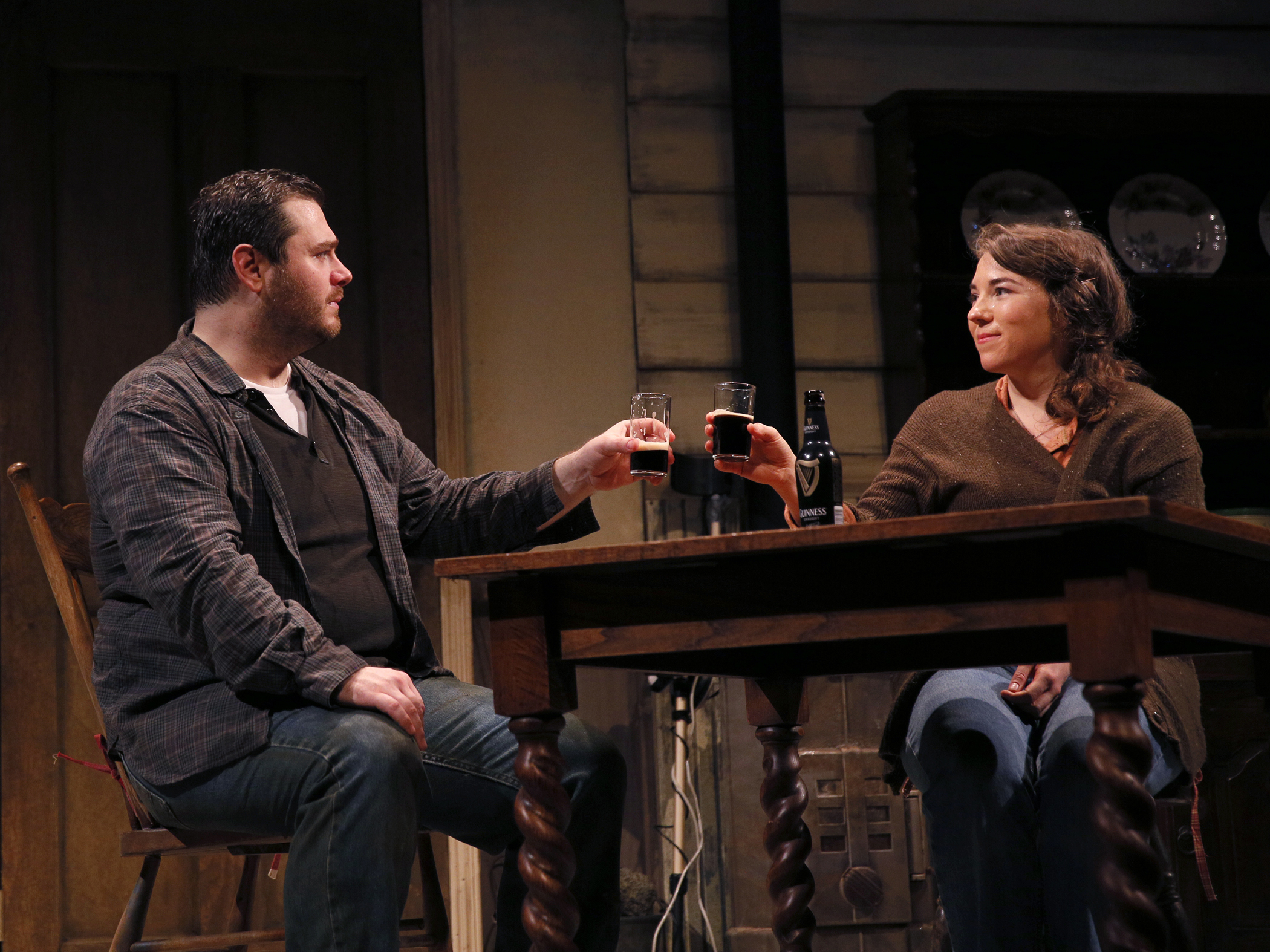Childhood friends Charlotte and Jonny are now living together at college, and Charlotte’s folks Howard and Lucinda aren’t thrilled. They think Jonny, who was raised Baptist and is black, is not marriage material for their Jewish daughter. Nor are they thrilled to be dinner guests chez the cohabitors, sitting on pillows around a low table, eating salad and butterless bread a la “homeless,” as Howard describes it. Howard (the excellent Ray Abruzzo of The Sopranos and Transparent) misses no opportunity to deride the hosts’ efforts, which sets him up as a classical Molière-style blocking tyrant. In short order he will make your flesh crawl—as a skinflint, complainer, tribalist, bully, and snob. He also obliviously oozes bigotry, misogyny, and homophobia.
ACT’s production of Bathsheba Doran’s sprawling, blithe 2015 stage play The Mystery of Love & Sex is about fledgling gay friends who are terrified of their own respective preferences. It’s a crowd-pleaser, if laugh meters are the measure of pleasure. In 10 chunky scenes divided by an intermission, Doran, who wrote for Boardwalk Empire, Smash, and Masters of Sex, ekes innumerable squibs of humor. Director Allison Narver’s cast expands on those squibs in order to play to the Allen Theater’s audience-in-the-round. When the humor is on—relatable and not overwrought—it’s very on. One such moment comes when Howard, eager to relate to his daughter’s burgeoning reality, contributes his own wisp of a homosexual experience: “You know about 20 years ago I was in the West Village in Manhattan eating a popsicle … ” Mary Kae Irvin also kills in the role of long-suffering wife Lucinda, whose utterly loony cigarette-avoidance technique involves silent finger-snapping and harsh vocalization reminiscent of an angry bird. At times, however, jokes are made simply because they can be—a hazard of over-cleverness.
So too do Emily Chisholm (as Charlotte) and Lorenzo Roberts (Jonny), both hugely charismatic and talented actors, nail their humorous stuff, including cringeworthy nude scenes. Deliberately or not—maybe due in part to the script’s gabbiness, which requires speed to get through—Charlotte comes off as a pushy, solipsistic brat, which makes it hard to see the play as her story. Jonny, who grew up religious, without a father, and with little academic encouragement, outpaces her on every developmental level except acceptance of his own sexuality. He is a quasi-family member, but Howard and Lucinda more often treat him like a servant; early on Howard pledges to “whip him into shape,” and even Jonny realizes it’s a job being Charlotte’s friend. I found myself distractingly distressed by the family’s callousness toward Jonny, and wanted to deny them my laughter (not that I could). Jonny periodically confronts his mistreatment, but then keeps coming back for more. His plight as de facto bastard stepson comes to fruition in two visually shocking scenes: as he swings, drunk and morose, on a tire in Lucinda’s yard, hunched under lighting designer Andrew D. Smith’s poignant bough shadows (given the play’s contemporary Southern setting, the image suggests a social lynching of sorts); and dancing like a nerd stark naked to win admission to a family event. Roberts, sporting a Bart Simpson-shaped do, is a naturalistic, show-anchoring presence in the role.
Themes of intergenerational continuity and fluidity of sexual identity abound as the parents disclose their own secrets and pass from acceptance of to enthusiasm for their daughter’s orientation. Robertson Witmer’s interstitial music ups the sentimental link with catchy ’90s covers of ’70s music, e.g., Cake’s “I Will Survive” and “Operator” by Glitterish. Spare sets by Matthew Smucker all feature low-walled semi-enclosures of faux marble, lending a whiff of classical antiquity. In one particularly effective set change, Charlotte stands in near-darkness watching the physical elements of her life getting rearranged—a poignant way to convey time passing.
Though only two and a quarter hours, the run time feels longer, so packed is this play with fretting bullshit sessions and the marrow of life. Two young souls stumble toward self-acceptance, two older ones stumble toward reconfigured futures. It’s a lot of stumbling. But that’s the point and charm of Mystery. At times all that stumbling can feel a bit homogenous, but it’s the human condition.
Ultimately all the character arcs land where they need to, and we are treated to a celebration—at least partially earned, if contrived. Everyone is freed to love whom they love, and in that, also to love each other. These four veterans survived and triumphed in the war against social expectations. Here’s hoping future troops will have it easier.
ACT Theatre, 700 Union St., 292-7676, www.acttheatre.org. $20 and up. Thru June 26.
stage@seattleweekly.com








